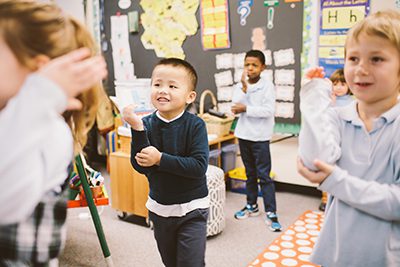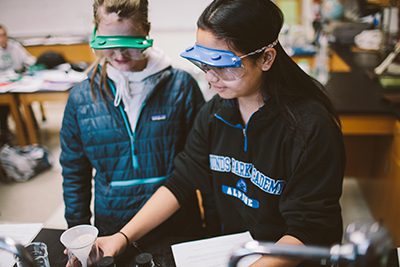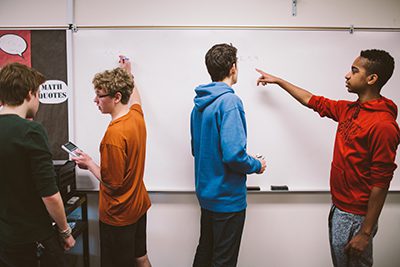December 27, 2017
 When we reflect on the benefits of private school in general, and MPA specifically, the word “connection” comes to mind. When we talk about connection in the context of private school benefits, we see it as a thread through all that we do and offer. We see creating connections as central to the benefits of a private school education.
When we reflect on the benefits of private school in general, and MPA specifically, the word “connection” comes to mind. When we talk about connection in the context of private school benefits, we see it as a thread through all that we do and offer. We see creating connections as central to the benefits of a private school education.
Small class sizes allow teachers to connect with their students and students to connect with the subject.
Small class size is the most often-cited benefit of a PreK-12 private school education. Small class sizes mean that teachers are able to know their students, better evaluate their academic and personal strengths and challenges, and then engage them in ways that ensure they thrive.
Fewer students in a class—combined with the freedom and flexibility that comes with teaching at a private school—means that faculty can create active and engaging learning opportunities with real-world applications that excite and challenge students. With their emphasis on collaboration, critical thinking, problem solving, and deep understanding over rote memorization, MPA teachers encourage and empower students to dive deep into the subject matter at hand, to answer the “why.”
Shared values, not geography, help create a connected community.
MPA, like many other private schools, has a clear mission and set of core values that includes involved and engaged students; open discourse and academic rigor; a balance of academics, arts, and athletics; experiential learning led by exceptional faculty; mutual respect and meaningful service; technology as an integral part of learning; and a school-wide spirit of innovation. We are strongly committed to diversity, freethinking, and collaboration, which creates a welcoming, inclusive, respectful, and connected community with an unassuming culture.
Our students and families come from many different backgrounds and neighborhoods, but they share similar values and want to be part of a community that fits them. According to MPA director of admission, Craig Dodson, “Parents choose MPA for their children with a clear understanding of what they will find and experience here and what they will not. We are very forthcoming about who we are—and who we are not—and we believe it is our duty to share that with prospective and current families. We have a responsibility to promote and nurture the culture that we espouse at MPA and make our admission decisions accordingly.”
Parents of seniors often tell Dodson that the milestone of graduation makes them realize what deep connections they built with the other families in the graduating class. “Long after their children have graduated, alumni parents continue to spend time together,” said Dodson. “They aren’t just connected because of their children; they share similar values and beliefs, which is what drew them to MPA from the start.”
 Vast and accessible extracurricular opportunities connect students to their passions, each other, and the school community.
Vast and accessible extracurricular opportunities connect students to their passions, each other, and the school community.
At private schools, students have the opportunity to pursue their passions for art, music, robotics, engineering, athletics, debate, and other activities, and not at the exclusion of other interests. At MPA, we strongly believe that extracurricular activities complement the academic experience by providing balance to our students’ lives and deepening their connection to each other and our school community. Our students have myriad opportunities to develop and pursue their passions, regardless of where they are in their personal mastery, and they embrace them: 95 percent of MPA Middle School students participate in a club, activity, or sport.
“MPA students can be deeply involved in the arts and be strong athletes at the same time,” said Dodson. “Or they can be into math and history—it’s all celebrated at MPA.”
In contrast, at a larger school, it can be challenging or impossible for students to pursue multiple activities or passions, requiring them to pigeonhole themselves into one identity. At some schools, students might not be able to participate at all, if there are only spots available for the top athletes, musicians, debaters, or actors to compete or perform. If students are at the top, then the pressure and competition to maintain that level can take a toll on their mental and physical health.
We encourage all of our students to participate in competitive activities outside of the classroom to help them develop a sense of commitment, perseverance, and teamwork, as well as leadership and initiative, all skills that will help them to succeed in school and life. We also find that students who work together on a shared goal build meaningful connections that strengthen their ties to each other and the school community. Plus, because MPA faculty often play dual-roles as coaches and club advisors, our extracurricular activities are often extensions of our classrooms, continuing to build the teacher-student connections and sense of belonging.
A connected and supportive community helps students become their best selves.
Private school teachers, administrators, and staff are well-positioned to know, understand, and support the children and families at their school. Beyond the small class sizes, the intentionally cultivated school community, and student participation in extracurricular activities with dual-role teachers, private schools often inspire parental involvement, encourage open communication, and host various events to strengthen parents’ connection to the school and build community.
At MPA, creating that connection starts with our admissions office and ensuring that MPA is the right fit for a given child and family. “MPA is a community that parents and students choose to join,” said Dodson. ‘If parents are going to make the investment in our school from a time, financial, and emotional perspective, we want to it be a place where their child will be successful.”
Every child in our school is known by and understood by many adults in the building, so we know when issues arise or when a child is simply off. We’re attuned to where our students are personally, academically, emotionally, and socially, and we’re here to support them. If problems emerge, then we work through them openly and respectfully with the student or students, and the parents, if necessary, always focused on the end-goal: for each MPA student to become their best self.
 We invite you to connect with Mounds Park Academy.
We invite you to connect with Mounds Park Academy.
If your child is not a student at MPA, and you heard stories over winter break that gave you pause about their current school environment, we invite you to reach out to learn more about MPA. The 2018-19 academic year admission season is in full swing, and now is the time to consider MPA. The Priority Admission Deadline is February 15, 2018. Space may not be available in the grade you are considering after this date and financial assistance will be limited or unavailable. We look forward to getting to know your entire family!
For any questions related to MPA admission, please contact the Office of Admission at 651-748-5577 or admission@moundsparkacademy.org.